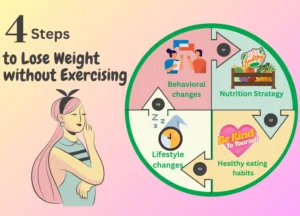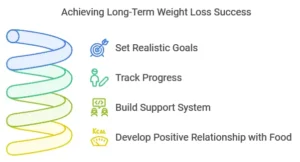How to Lose Weight Without Exercising at Home: 4 Easy Steps

It may seem hard to reduce weight without exercise, but it is not difficult when you have a good plan. So, if you want to know how to lose weight without exercising at home, you are at the right place. Many people face challenges like, physical limitations, time factors, or simply preferring non-exercise methods. The good news is that losing weight is mostly about eating fewer calories than you burn, and you can do it without ever stepping foot in the gym.
You can shed pounds at home if you focus on dietary changes, lifestyle adjustments, and good eating habits. This article will guide you through the steps and provide evidence-based strategies to reach your weight loss goals without relying on exercise.
What does “without exercise” really mean?
When we talk about losing weight “without exercise,” we don’t mean being completely inactive. Instead, we refer to achieving weight loss through diet and lifestyle changes rather than a regular exercise routine.
Many people have barriers to traditional exercise, whether due to medical conditions, lack of time, or a lack of interest in exercise. This approach focuses on improving other aspects of your daily routine to create a calorie deficit, which is key to weight loss. Research shows that diet plays a more important role in weight loss than exercise.
A study published in the American Journal of Clinical Nutrition found that reducing calorie intake is more effective for weight loss than increasing physical activity alone. Choosing healthy foods and developing healthy habits can help you lose weight without exercising.
Additionally, non-exercise activities like walking more, standing instead of sitting, and doing housework can help you burn extra calories throughout the day. By focusing on these strategies, you can achieve your weight loss goals without engaging in a structured exercise routine.
Does it work?
Yes, losing weight without exercise can be effective, and the science backs it up. Weight loss creates a calorie deficit, which means you eat fewer calories than your body needs to maintain your current weight. Exercise is one way to burn calories but not the only way. You can lose weight without ever stepping foot in the gym by reducing your calorie intake through mindful eating and healthy food choices.
A study published in the British Journal of Sports Medicine emphasized that diet is the most important factor in weight loss over physical activity. The researchers pointed out that although exercise is important for overall health, dietary changes are more effective for reducing body weight. This is why many people succeed with weight loss programs, prioritizing dietary changes over exercise routines.
In practice, this may look like reducing portion sizes, avoiding high-calorie snacks, and adding more fruits, vegetables, and lean protein to your meals. This strategy helps with weight loss and also promotes better overall health, making this approach effective and sustainable in the long term.
How to Lose Weight Without Exercising at Home

Nutrition Strategy
Focus on a balanced diet.
A balanced diet is the basis for weight loss without exercise. To achieve this goal, emphasize whole foods rich in nutrients and low in empty calories. Found in fruits, vegetables, lean proteins such as chicken and fish, whole grains, and healthy fats such as avocados and nuts. These foods help you feel full and satisfied and provide essential nutrients that support overall health. A balanced diet naturally helps regulate calorie intake, making it easier to cut calories without feeling deprived.
Control your calorie intake.
Controlling calorie intake is critical when exercise is not part of your weight loss plan. This does not mean reducing your food intake; instead, focus on portion control and mindfulness. Using smaller plates, measuring portions, and knowing what and how much you eat can prevent overeating.
Research published in the Journal of the American Medical Association (JAMA) shows that reducing portion sizes can lead to significant weight loss over time. Keeping your portions in mind, you can reduce your daily calorie intake without drastically changing your diet.
Smart snacking
Snacking can be a double-edged sword when trying to lose weight. The key is to choose smart snacks that satisfy hunger without adding too many calories. Choose nutritious and low-calorie snacks like nuts, yogurt, fruits, and vegetables. Avoid high-sugar, high-fat snacks, which can lead to weight gain.
A study in the Journal of Nutrition found that people who ate healthy snacks like fruits and vegetables had better weight and overall health than those who ate processed foods. By choosing smart snacks, you can keep hunger at bay and stay on track with your weight loss goals.
Read more: Low-carb Snacks for Weight Loss.
Stay hydrated
Hydration plays an important role in weight loss. Drinking plenty of water can help control your appetite, improve digestion, and boost your metabolism. Sometimes, people confuse thirst with hunger, which causes them to overeat. Staying hydrated can prevent this confusion and reduce your calorie intake. According to a study, drinking water before meals can significantly reduce calorie intake and aid in weight loss. Make it a habit to drink water throughout the day, especially before meals, to help manage your weight effectively.
These nutritional strategies are simple yet powerful tools in your weight loss journey. By focusing on a balanced diet, controlling portions, making smart snack choices, and staying hydrated, you can effectively lose weight at home without relying on exercise.
Healthy Eating Habits

Practice mindful eating
Mindful eating is a powerful habit that can significantly impact your weight loss journey. This includes:
- being fully present while eating
- paying attention to the taste, texture, and aroma of the food
- and listening to your body’s hunger and fullness signals.
- Eating slowly and savoring each bite make you satisfied, which helps prevent overeating.
A study published in the Journal of Obesity found that mindful eating practices are associated with reduced food intake and a healthier relationship with food. This approach helps you make conscious decisions about what and how much to eat, making it easier to manage your weight.
Plan and prepare your meals.
Meal planning and preparation are essential strategies for losing weight without exercising at home. By planning your meals ahead of time, you can ensure that your diet remains balanced and nutritious even on busy days. Preparing meals in advance also reduces the temptation to order takeout or rely on processed foods, which are often high in calories and low in nutrients.
Start by setting aside time each week to plan your meals, make a grocery list, and prepare ingredients or whole meals in advance. This will help you follow your diet plan and avoid excessive eating.
Also, explore the 5 Best Weight Loss Diet Plans for Women.
Manage emotional eating
Emotional eating is a common challenge for many people, especially when losing weight. It occurs when you eat in response to feelings like stress, boredom, or sadness rather than true hunger. Since emotional eating frequently involves comfort foods that are heavy in calories, it can result in overeating and weight gain.
Identifying the causes and creating healthier coping mechanisms are essential for managing emotional eating. These can include a walk, practicing relaxation techniques, or engaging in activities that keep your hands and mind busy.
A study published in Appetite found that people who develop strategies to deal with emotional eating are more successful at weight management. You can cut down unnecessary calories and stay on track with emotional eating!
Lifestyle Adjustments
Improve your sleep
Quality sleep is an important, but often overlooked, component of weight loss. When you don’t get enough sleep, your body’s hunger hormones—ghrelin and leptin—become unbalanced, leading to increased hunger and cravings, especially for high-calorie foods. A study published in the Annals of Internal Medicine found that insufficient sleep may reduce the effectiveness of dietary efforts to lose weight, as sleep-deprived individuals lose muscle mass and retain more fat.
Sleep for 7-9 hours each night to meet your weight loss goals. Establishing a regular sleep schedule, a calm bedtime routine, and a comfortable sleep environment can all help improve sleep quality.
Manage stress effectively
Stress management is another important lifestyle adjustment for weight loss. Chronic stress can lead to overeating, especially foods high in sugar and fat, which can sabotage your weight loss efforts. Stress also triggers the release of cortisol, a hormone that promotes fat storage, especially around the abdomen. According to a study published in the Journal of Molecular Biochemistry, chronic stress is linked to weight gain and difficulty losing weight.
Incorporating stress-reducing activities into your daily routine can help manage it. Techniques like deep breathing, meditation, yoga, and regular day breaks can reduce stress and help you lose weight without exercising at home.
Increase daily activity
Although this guide focuses on weight loss without exercise, increasing your daily activity can still play a significant role. Non-exercise activity thermogenesis (NEAT), which includes all the physical activity you do outside of structured exercise (like walking, cleaning, or even jogging), can help you burn extra calories throughout the day.
A study in the American Journal of Clinical Nutrition found that NEAT can vary significantly between individuals and can be a major contributor to daily energy expenditure. Simple changes, such as taking the stairs instead of the elevator, walking or cycling, or standing while working, can increase your NEAT and help you lose weight.
A supportive home environment
Your environment plays an important role in your ability to maintain a healthy lifestyle. An environment full of unhealthy food options can tempt you to stray from your goals. Conversely, a well-organized kitchen with nutritious foods, and a home that encourages movement and stress relief, can help you on your weight loss journey.
According to research published in the Annual Review of Nutrition, creating an environment that promotes healthy choices is essential to long-term success in weight management. Consider decluttering your space, keeping healthy snacks visible and accessible, and creating designated areas for rest and activity to fuel your weight loss efforts.
Behavioral and Mindset Changes

Realistic weight loss goals
Long-term success in weight loss depends on setting realistic and practical goals. Instead of aiming for major shifts, make small, consistent improvements. Most people have a healthy weight loss rate of about 1 to 2 pounds per week. This may sound slow, but it is more manageable and reduces the chances of regaining the weight later.
A study published in the International Journal of Obesity found that setting small, realistic goals can lead to more significant weight loss as individuals are more motivated and committed to their journey. Start by setting specific, measurable, and time-bound goals, such as losing 5 pounds in a month or reducing your daily calorie intake by 200 calories.
Track your progress
Monitoring your progress is essential for staying on track with your weight loss goals. Keeping a food journal, tracking your daily calorie intake, or using a mobile app can help you stay accountable and make informed decisions about your diet and lifestyle. The research found that people who regularly tracked their food intake were more successful at losing weight than those who didn’t.
Tracking helps you identify patterns, such as emotional eating or overeating at certain times, allowing you to make necessary adjustments. Celebrate small achievements for motivation, such as sticking to your meal plan or reaching a milestone.
Building a support system
Having a strong support system can significantly enhance your weight loss journey. Whether it’s friends, family, or an online community, surrounding yourself with people who encourage and motivate you can make a big difference. A study highlights that social support is important for achieving and maintaining weight loss.
Sharing your goals with others, seeking advice, and finding a weight loss buddy can provide the motivation and accountability you need to stay on track. Consider joining a weight loss group or following supportive communities on social media to connect with like-minded people.
Positive relationship with food
Establishing a healthy, positive relationship with food is essential for long-term weight management. Instead of seeing food as the enemy, see it as fuel for your body, and focus on nourishing yourself with healthy, nutritious options. Avoid labeling foods as “good” or “bad” which can lead to guilt and unhealthy eating behaviors. Instead, practice balance and moderation, allowing yourself to enjoy all foods in appropriate portions.
A study in the Journal of Eating Disorders found that those with a positive relationship with food tend to maintain a healthier weight and experience less stress about eating. This mindset helps reduce emotional eating and encourages healthy choices, aiding weight loss without exercise.
How to overcome common challenges
Dealing with Cravings
Cravings can be the biggest obstacle in your weight loss journey, whether due to emotional triggers, habits, or nutritional deficiencies. To overcome cravings, try to identify the root cause whether it’s stress, boredom, or a need for a certain nutrient.
A study published in Appetite suggests that distraction techniques, like engaging in a hobby or a walk, can help reduce cravings. Additionally, healthy snacks can help prevent cravings for unhealthy options. Drinking water or herbal tea can also help manage cravings by filling you up and keeping you hydrated.
Navigating social situations
Social events and gatherings can be difficult when you’re trying to lose weight. An abundance of high-calorie foods and peer pressure can make it difficult to stick to your dietary goals. To successfully navigate social situations, plan by eating a healthy meal or snack before attending the event to curb hunger. You can also make well-informed decisions by reviewing the menu in advance or selecting better choices.
A study in the Journal of Nutrition Education and Behavior found that planning and making healthy choices in social settings can significantly influence weight loss success. Be bold and discuss your objectives with loved ones; they can provide motivation and advice.
Maintain consistency
Consistency is the key to any successful weight loss strategy, but it cannot be easy to maintain. One way to stay consistent is to establish a routine by incorporating healthy habits into your daily life. Tracking your progress and setting small, achievable milestones can help maintain motivation. According to research published in Behavioral Medicine, people who create routines and set regular goals mostly stick to their weight loss plans.
If you experience setbacks, view them as temporary setbacks rather than failures. Reflect on what went wrong, adjust your approach if necessary, and continue working toward your goals with renewed determination.
Easy maintenance tips
- Begin by gradually increasing your calorie intake to a level that will maintain your new weight without further loss. The key is to find a balance that allows you to enjoy your food while avoiding weight regain. Monitor your weight regularly and adjust your eating habits to stay within your target range.
- To maintain weight loss, focus on incorporating sustainable lifestyle changes rather than extreme diets or temporary fixes. Adopt a lifestyle that includes a variety of nutritious foods, regular physical activity, and stress management techniques to help maintain overall health and weight.
- Regular self-examination is critical to weight maintenance. This involves monitoring your weight, taking note of the foods you eat, and evaluating how well you’re following your healthy lifestyle.
- Keeping a food diary or using a mobile app can help you stay accountable and make necessary adjustments to your diet and lifestyle. Periodically review your progress and set new goals to stay motivated and on track.
- Adding rewards to your weight maintenance plan can help keep you motivated. However, choose rewards that don’t involve food, such as a new outfit, a spa day, or a fun activity. Reward yourself regularly for sticking to your maintenance plan to maintain motivation and enjoyment in your journey.
By implementing these simple maintenance tips, you can effectively maintain weight loss. These strategies help you maintain a healthy weight and enjoy a balanced and fulfilling lifestyle.
Conclusion
Losing weight without exercise is entirely possible through careful diet management, lifestyle, and behavior. You can achieve and maintain your weight loss goals at home by focusing on effective nutritional strategies, developing healthy eating habits, and making important lifestyle changes.
Remember, achieving weight loss without exercise involves more than changing what you eat—it’s about making a balanced, mindful approach to your everyday life. By adhering to these principles, you may efficiently control your weight and lead a healthier, more meaningful life.
Frequently Asked Questions
1. Can I lose weight without exercise if I have a slow metabolism?
Yes, you can lose weight even if you have a slow metabolism. The key is to focus on creating a calorie deficit through dietary adjustments and healthy eating habits. Metabolism plays a role in burning calories. You can also increase your metabolism by eating more protein, staying hydrated, and getting enough sleep.
2. Is intermittent fasting effective for weight loss without exercise?
Intermittent fasting can be an effective way to lose weight without exercise. This approach involves cycling between meals and fasting intervals, which can help reduce overall calorie intake. Research indicates intermittent fasting can decrease the risk of chronic diseases, enhance metabolic health, and aid in weight loss. Choose a fasting schedule that fits your lifestyle and ensures a balanced, nutritious diet even during meal periods.
3. How much weight can I realistically expect to lose without exercise?
The amount of weight you can lose without exercise depends on your starting weight, age, diet, and lifestyle factors. A safe and sustainable rate of weight loss is about 1 to 2 pounds per week. Although results may vary, focusing on consistent, small changes to your diet and lifestyle can lead to significant weight loss over time.
4. Should I take weight loss supplements if I am not exercising?
Weight loss supplements are not necessary and can be dangerous, especially if not used under the guidance of a health care professional. The best way to lose weight without exercise is to make healthy eating and lifestyle changes. Some supplements can have side effects or interact with medications, so it’s important to consult a doctor before considering them. Relying on natural, whole foods and making sustainable lifestyle changes is a safer and more effective way to lose weight.
5. Can I maintain muscle mass while losing weight without exercise?
Maintaining muscle mass while losing weight without exercise can be difficult, but it is possible by consuming enough protein. Protein is essential for muscle maintenance, especially when you’re losing weight. Include protein-rich foods such as lean meats, fish, eggs, dairy, beans, and nuts. Although exercise, especially strength training, is the best way to preserve muscle, a high-protein diet can help reduce muscle loss during weight loss.
6. How important is hydration for weight loss without exercise?
Hydration is vital to weight loss, even without exercise. Drinking water can help control appetite, improve digestion, and boost metabolism. Sometimes, your body may crave hunger, leading to unnecessary food intake. Drinking plenty of water throughout the day, especially before meals, can help you consume fewer calories and aid in your weight loss efforts.






